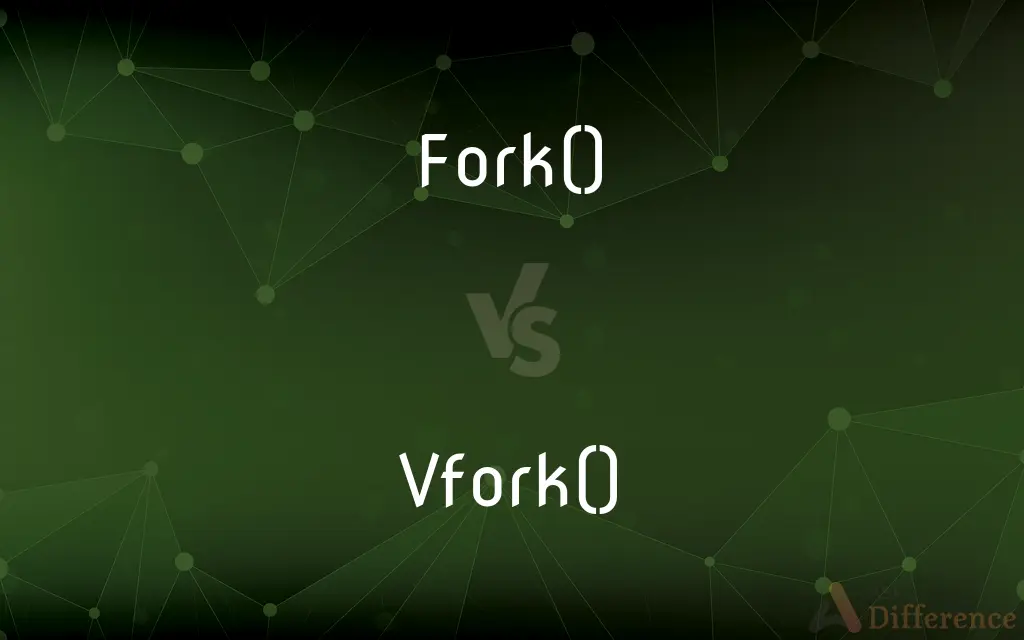Fork() vs. Vfork() — What's the Difference?
By Tayyaba Rehman — Published on January 2, 2024
Fork() creates a new process by duplicating the existing process, with separate memory allocation. Vfork() creates a child process sharing the parent's memory space, used for efficient process creation.

Difference Between Fork() and Vfork()
Table of Contents
ADVERTISEMENT
Key Differences
Fork() is a system call in Unix-like operating systems that creates a new process. This new process, known as the child process, is an exact copy of the calling process, the parent, with its own separate memory space. Vfork(), on the other hand, is a variant of fork() that was designed to be more efficient in specific scenarios. Unlike fork(), vfork() creates a child process that shares the memory space of the parent process until it calls exec() or exits.
In terms of resource utilization, fork() is more resource-intensive as it requires copying the entire address space of the parent process. This can be costly in terms of CPU and memory usage, especially for processes with large memory footprints. Vfork() addresses this issue by not duplicating the parent's address space, which makes it faster and less memory-intensive, particularly useful when the child process intends to call exec() immediately after creation.
The safety and behavior of the two calls also differ. With fork(), the separate memory allocation ensures that the parent and child processes do not interfere with each other's memory, leading to a more stable and predictable behavior. Vfork(), by sharing memory space, poses a risk of the child process altering the parent's memory, potentially leading to unexpected behaviors or errors if not carefully managed.
Another key difference is in the execution order. After a fork(), both parent and child processes may execute concurrently in no particular order. In contrast, after a vfork(), the parent process is suspended until the child process either calls exec() or exits. This ensures that the child process completes its critical section of code that might affect the parent's memory before the parent resumes execution.
In summary, while fork() is a safer and more isolated approach to creating a new process, vfork() offers efficiency benefits at the cost of increased complexity and potential risks due to shared memory. The choice between the two depends on the specific requirements and constraints of the application.
ADVERTISEMENT
Comparison Chart
Memory Space
Allocates separate memory for child process.
Shares parent process’s memory space.
Resource Usage
More resource-intensive (CPU, memory).
Less resource-intensive, efficient for exec().
Process Safety
Safer, as memory is not shared.
Riskier, due to shared memory space.
Execution Order
Parent and child may execute concurrently.
Parent suspended until child calls exec() or exits.
Use Case
General purpose process creation.
Efficient when child immediately calls exec().
Compare with Definitions
Fork()
It duplicates the calling process, creating two parallel execution paths.
After calling fork(), the application ran its database query and web server concurrently.
Vfork()
Vfork() creates a child process that shares the parent's memory space.
The script used vfork() to efficiently create a child process for running an external command.
Fork()
Fork() creates an independent child process with a separate memory space.
The server used fork() to handle each incoming connection in a separate process.
Vfork()
Vfork() suspends the parent process until the child process exits or calls exec().
In the system script, vfork() ensured the parent process waited for the setup completion.
Fork()
It results in two processes that are identical at the time of creation.
The simulation software used fork() to create multiple scenarios running simultaneously.
Vfork()
It minimizes the memory overhead involved in process creation.
The embedded system used vfork() to create new processes without excessive memory use.
Fork()
Fork() is used for creating processes in Unix-like operating systems.
The Unix shell implemented commands in separate processes using fork().
Vfork()
Vfork() is a specialized version of fork() for specific use cases.
Vfork() was chosen over fork() for its efficiency in a resource-constrained environment.
Fork()
Fork() allows concurrent execution of parent and child processes.
The multitasking system employed fork() to execute multiple tasks at the same time.
Vfork()
It is designed for efficient process creation when immediate exec() is intended.
Vfork() was used to quickly spawn a child process before executing a new program.
Common Curiosities
What is Vfork()?
Vfork() is a variant of fork() that creates a process sharing the parent's memory space.
In what scenario is Vfork() preferred?
Vfork() is preferred when a child process is created to execute a new program immediately.
What is Fork()?
Fork() is a system call to create a new process with a separate memory space in Unix-like systems.
How does Fork() affect system resources?
Fork() can be resource-intensive due to duplicating the parent process's memory.
Why use Fork() over Vfork()?
Fork() is used for its safety and independence of the child process due to separate memory allocation.
What happens to the parent process in Vfork()?
The parent process is suspended until the child process calls exec() or exits.
Why was Vfork() introduced?
Vfork() was introduced to improve efficiency in scenarios where the child process immediately calls exec().
Is Vfork() still used in modern systems?
Its usage has declined but may still be found in systems with specific efficiency requirements.
Can Fork() and Vfork() be used interchangeably?
Not ideally, as they serve different purposes and have different implications on process behavior and memory management.
Is Fork() safer than Vfork()?
Yes, Fork() is generally safer due to the isolation between parent and child processes.
Does Vfork() save CPU time?
Yes, by avoiding memory duplication, it saves CPU time and resources.
Are there alternatives to Fork() and Vfork()?
Yes, modern Unix-like systems have other system calls like clone() and posix_spawn() for process creation.
Does Vfork() have any risks?
Yes, Vfork() risks memory corruption or instability due to shared memory space with the parent.
Can Fork() lead to memory wastage?
Yes, especially if the child process is created just to execute a different program.
How does Fork() handle concurrent execution?
Fork() allows both parent and child processes to run concurrently in separate memory spaces.
Share Your Discovery

Previous Comparison
American Revolution vs. French Revolution
Next Comparison
Double Cheeseburger vs. McDoubleAuthor Spotlight
Written by
Tayyaba RehmanTayyaba Rehman is a distinguished writer, currently serving as a primary contributor to askdifference.com. As a researcher in semantics and etymology, Tayyaba's passion for the complexity of languages and their distinctions has found a perfect home on the platform. Tayyaba delves into the intricacies of language, distinguishing between commonly confused words and phrases, thereby providing clarity for readers worldwide.














































